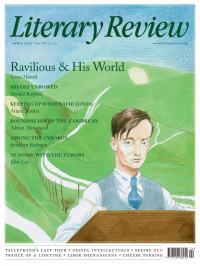Fiona Stafford
In Apricot Place
The Walworth Beauty
By Michèle Roberts
Bloomsbury 389pp £16.99
Joseph, Madeleine, Joseph, Madeleine, and so on: the two stories in Michèle Roberts’s new novel, separated by more than a century, alternate from beginning to end. One moment we are in the seedy side streets of Victorian London, the next in a sleek bar in the City. More disconcerting than the shifting locations are the contrasting perspectives of Joseph, married with three children and newly recruited by Henry Mayhew to research another volume of his encyclopaedic report, London Labour and the London Poor, and Madeleine, sixty, divorced, no children, and now forcibly retired from her post as a lecturer in English. Joseph is profoundly discomposed by his current commission to gather evidence directly from London’s prostitutes, Madeleine by her decision to sport black fishnet hold-ups for an evening out, where she’s surrounded by smart suits and women much younger than she is, with no other fishnets to be seen. What begins with two isolated lives, almost like the opening of a sequence of short stories, gradually starts to offer points of connection, with the echoes growing more insistent and the chapters shrinking until all voices join together at last.
Both are stories of survival. Joseph battles to support his wife and children after losing his job, gaining a post as Mayhew’s research assistant, only to be sacked again after suggesting that the city’s young streetwalkers are victims rather than hardened sinners. Madeleine, redundant because of cuts to

Sign Up to our newsletter
Receive free articles, highlights from the archive, news, details of prizes, and much more.@Lit_Review
Follow Literary Review on Twitter
Twitter Feed
Margaret Atwood has become a cultural weathervane, blamed for predicting dystopia and celebrated for resisting it. Yet her ‘memoir of sorts’ reveals a more complicated, playful figure.
@sophieolive introduces us to a young Peggy.
Sophie Oliver - Ms Fixit’s Characteristics
Sophie Oliver: Ms Fixit’s Characteristics - Book of Lives: A Memoir of Sorts by Margaret Atwood
literaryreview.co.uk
For a writer so ubiquitous, George Orwell remains curiously elusive. His voice is lost, his image scarce; all that survives is the prose, and the interpretations built upon it.
@Dorianlynskey wonders what is to be done.
Dorian Lynskey - Doublethink & Doubt
Dorian Lynskey: Doublethink & Doubt - Orwell: 2+2=5 by Raoul Peck (dir); George Orwell: Life and Legacy by Robert Colls
literaryreview.co.uk
The court of Henry VIII is easy to envision thanks to Hans Holbein the Younger’s portraits: the bearded king, Anne of Cleves in red and gold, Thomas Cromwell demure in black.
Peter Marshall paints a picture of the artist himself.
Peter Marshall - Varnish & Virtue
Peter Marshall: Varnish & Virtue - Holbein: Renaissance Master by Elizabeth Goldring
literaryreview.co.uk